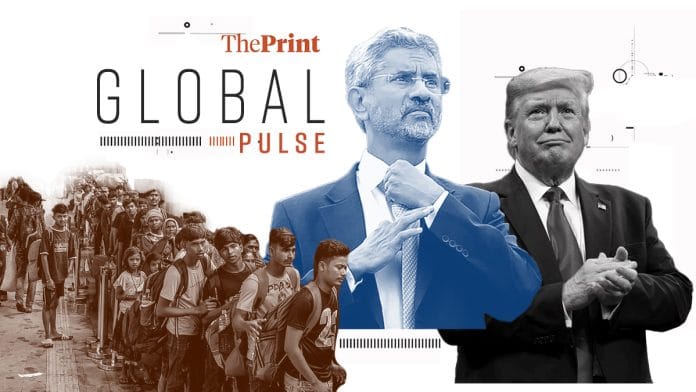New Delhi: Wednesday is the day Trump’s 50 percent tariffs on India kick in. Donald Trump’s shifting stance on India—which has led to an untimely deterioration of ties—has left ministers and officials of the rising power “scratching their heads,” writes Mujib Mashal in the New York Times’ Morning Briefing: Asia Pacific Edition.
“It’s not just that relations between the two countries have suddenly plunged to their lowest levels in decades. It’s also that no one here really understands why this happened, or what America wants from the relationship now. (India’s foreign minister used the word “perplexed” at a news conference last week.)” he writes, adding that “no one seems to be talking about cooperation on China”—which, not too long ago, was “a shared goal”.
India is “quietly creating a class of stateless people”—that too “under the cover of law”, writes journalist Rana Ayyub in an opinion article for the Washington Post. And nowhere, she writes, is this more visible than in the state of Assam, where Bengali Muslims are being targeted; accused of being “illegal Bangladeshi immigrants”.
“At the same time as the government is evicting Bengali Muslims, under the Citizenship Amendment Act, it has moved to grant citizenship to non-Muslim refugees from other countries. Religion has become the basis for belonging in India; only Muslims are targeted for Foreigner Tribunal cases,” she writes. The bulldozer, which was once a symbol of progress, now instils fear, she adds, referring to eviction drives and the state’s meting out of “bulldozer justice”.
“Mainstream Indian media has largely ignored the crisis while local Hindu-centric media often is an accomplice in the exercise of othering,” she goes on to say. “During many eviction drives, local media live telecast the demolitions and label the residents foreigners with no proof, parroting the official narrative.”
Indian Air Force Chief A.P. Singh is questioning the Modi government’s “military overhaul”. Speaking in Mhow, he said that India should not pick up “theatre commands” from other countries, reports Sudhi Ranjan Sen in Bloomberg.
“Modi is looking to reorganise the military into theatre commands that would pool warships, patrol craft, soldiers and fighter jets. The commands would work with other missile and gun regiments that have a network of ground radar to address major threats along disputed borders with China and Pakistan,” says the report.
The Wall-Street Journal’s Shan Li looks at how even before the deadly Air India crash, Indian pilots were going through a crisis. Airlines were short staffed and pilots were “stretched thin”.
“Friends of Sumeet Sabharwal, the captain of the Air India flight, said he was feeling overworked after the state-run airline was privatised four years ago and purchased by Tata Group, a holding company linked to one of India’s largest conglomerates,” reads the report. “The airline began changing pilot schedules more frequently, six pilots said in interviews. That pulled Sabharwal away from his duties as primary caretaker to his ailing father, said his friends.”
(Edited by Viny Mishra)
Also read: Surat diamond hub ‘direct casualty’ of Trump’s tool of ‘political coercion’ & ‘choked’ Bengaluru







Glad to see a terrorist has written an article and that too in Washington post. Cherry on the cake fact is that, we are discussing this shit in india…